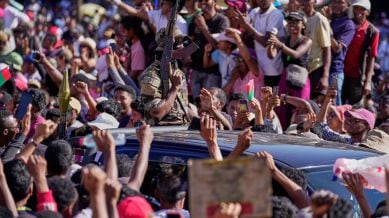Madagascar military seizes power after parliament impeaches President amid youth-led revolt
The announcement followed a parliamentary vote to impeach President Andry Rajoelina, who has since fled the country amid the rebellion.

Days after a youth-led rebellion swelled into a full-blown military mutiny, Madagascar’s armed forces on Tuesday announced they were taking power — marking a dramatic turn in the island nation’s worst political crisis in over a decade.
The declaration came from Col. Michael Randrianirina, a member of an elite military unit, who told reporters, as per Associated Press, that the armed forces would establish a transitional council comprising officers from the army and the gendarmerie. The council, he said, would quickly appoint a prime minister to form a civilian government.
monthly limit of free stories.
with an Express account.
The announcement followed a parliamentary vote to impeach President Andry Rajoelina, who has since fled the country amid the rebellion. His location remains unknown. In a video address posted Monday night, Rajoelina said he had moved to a “safe place” out of fear for his life but did not reveal where he was.
Earlier on Tuesday, Rajoelina had dissolved the lower house of parliament in an apparent bid to avoid impeachment, though the move failed to prevent lawmakers from proceeding.
The trigger
The crisis, ignited by a wave of Gen Z-led protests that began in late September over power and water shortages, has rapidly evolved into a nationwide movement against poverty, corruption, and Rajoelina’s leadership. The protests, led largely by young activists inspired by youth movements in Sri Lanka and Nepal, have drawn tens of thousands to the streets of Antananarivo.
“We do not get a constant supply of electricity and water from the government,” said protester Soavololona Faraniaina, AP reported. “If Madagascan children are studying in darkness, where will the future of this nation be?”
A turning point came on Saturday when soldiers from the elite CAPSAT unit — the same force that helped bring Rajoelina to power during a coup in 2009 — joined the protests and declared they no longer supported the president. CAPSAT has since assumed control of key security institutions, appointing new heads of the army and gendarmerie.
Though CAPSAT commanders have denied staging a coup, insisting that “the people should decide what happens next,” the military’s control over parts of the government suggests otherwise. Armoured vehicles have been seen patrolling the capital, where soldiers are greeted with cheers from crowds, even as uncertainty looms over the nation’s future, AP reported.
Madagascar, a former French colony with a long history of military-backed power shifts since independence in 1960, has been plagued by political instability. The current unrest is its gravest since 2009 — when Rajoelina, then a young mayor, led protests that ousted then-President Marc Ravalomanana.